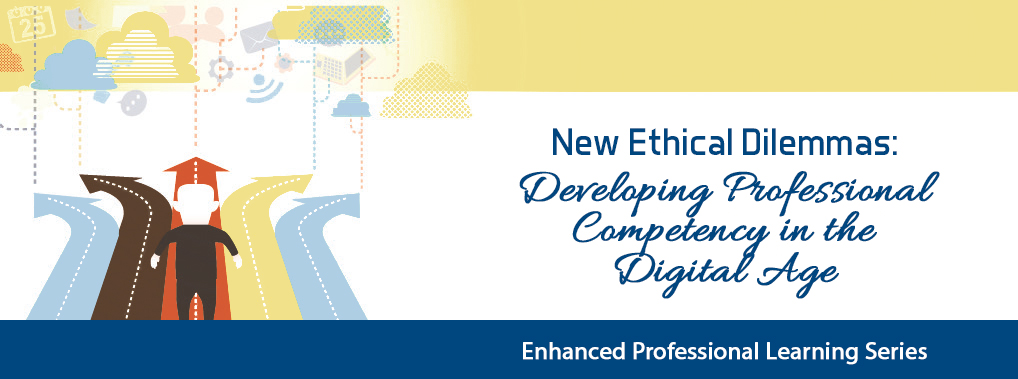

New Ethical Dilemmas: Developing Professional Competency in the Digital Age (NED)
The use of technology and social media networking sites by behavioral health professionals and peer support specialists for personal and professional purposes has increased. As such, ethical and practice issues like self-disclosure in postings, unintentional boundary crossings and violations, privacy and security problems reflect just some of the new dilemmas clinicians and peer support specialists will encounter. In recent years there has been guidance from professional/peer standards and ethical codes. There still remains a need for providers to remain vigilant about practice in this ever-changing landscape of this digital world.
This 7-week, in-depth, online learning series will address common ethical dilemmas behavioral health and peer support specialists face related to the use of technology, social networking sites, and web-based search engines. Case scenarios, group discussion questions related to videos, practice sessions, and other learning activities will be used to highlight these dilemmas and encourage discussions among participants related to: 1) Ethics, competency, and the use of technology; 2) Digital styles related to Digital Novices vs. Digital Pros; 3) HIPAA and 42 CFR Part II considerations for texting, email, and videoconferencing; 4) Use of social networking sites and potential ethical pitfalls; 5) Employer/employee issues with technology (social media policies); and 6) Applying ethical decision-making models with ethical dilemmas. This online learning series will provide 15 hours of instruction, learning activities, and self-study as well as interactive discussions/activities, videos, feedback, and articles.
WHEN:
Every Tuesday, October 15 – December 3, 2024 from 10:00 – 11:30 am MT / 11:00 am – 12:30 pm CT
OBJECTIVES:
- Name three ethical concerns related to the use of technology and social media
- Cite at least two ethical consideration in regard to communicating with clients that has impacted by the use of technology
- Understand personal preferences for communication and how this can impact working relationships with colleagues and clients
- Name one privacy consideration regarding texting patients/peers
- Identify one way that behavioral health providers and peer support specialists can help maintain confidentiality when emailing clients
- Discuss two elements that behavioral health providers and peer support specialists must consider before posting content online
- Recall three social media policy issues that may put organizations at risk if not addressed appropriately
- Identify at least two ethical decision-making models for use in practice and support services
- Name one reason why it is important to utilize decision-making models when faced with ethical dilemmas in practice
- Identify how the use of technology has become a practice competence in the provision of behavioral health and peer support services
- Develop competence related to behavioral health practice and peer support services using ethical decision-making models as it relates to the use of technology
- Identify two recommendations providers/peers must keep in mind when developing their professional on-line presence or digital footprint
TARGET AUDIENCE:
Professionals in behavioral health, substance use disorders, mental health disorders, and peer recovery support located in the Mountain Plains ATTC Region (HHS Region 8).
PARTICIPANT COMMITMENT & EXPECTATIONS
- Access to appropriate technology to utilize Zoom videoconferencing platform (internet connection, webcam, laptop/tablet, speakers and microphone)
- Attend a 1-hour online Orientation on Tuesday, October 15, 2024
- Commit to 6-weeks of online training for 1.5 hours weekly from October 22 – December 3, 2024 (No session Tues, Nov 26)
- Complete weekly self-study learning activities
TRAINER(S)/FACILITATOR(S):
- Christina Boyd, LSCSW, LCAC
- Maryellen Evers, LCSW, CAADC
THERE IS NO COST TO PARTICIPATE:
The first 40 registrants will receive a Mountain Plains ATTC waiver that covers the $400 cost to participate. Once the 40 spots have been filled, registration will be closed. Due to limited enrollment, if you cannot commit to the full requirements, please defer this opportunity to others. Registration is not transferable to another person.
Please Note:
Registrants enrolled in this series are required to attend the October 15 and 22 sessions. If you cannot attend these sessions, you will forfeit your attendance.
In addition, it is expected that participants will have access to the appropriate technology by October 22 in order to fully participate and be on camera at least 90% of the time. This is not a webinar series and active participation to gain/improve skills are required.
If you do not receive a welcome email by Oct 14th, please check your spam folder.
Continuing Education:
The series has been approved for a total of 16 contact hours (15 hours content instruction and a one-hour orientation session) through the National Association for Addiction Professionals (NAADAC), International Certification & Reciprocity Consortium (IC&RC), and the National Board for Certified Counselors (NBCC) ACEP No. 6492. No credit will be awarded for non-attendance or partial attendance.
The knowledge and skills learned should be applied within the framework of any applicable Operating and/or Credentialing regulations in your State of practice.
Click to Register
QUESTIONS:
Please contact the MPATTC Workwise Staff at mpattc@casat.org or by phone at 775-784-6265 or 866-617-2816 (toll-free).
